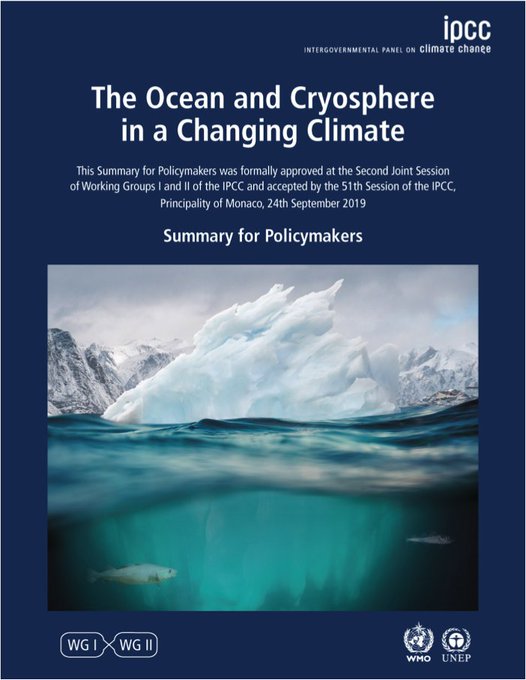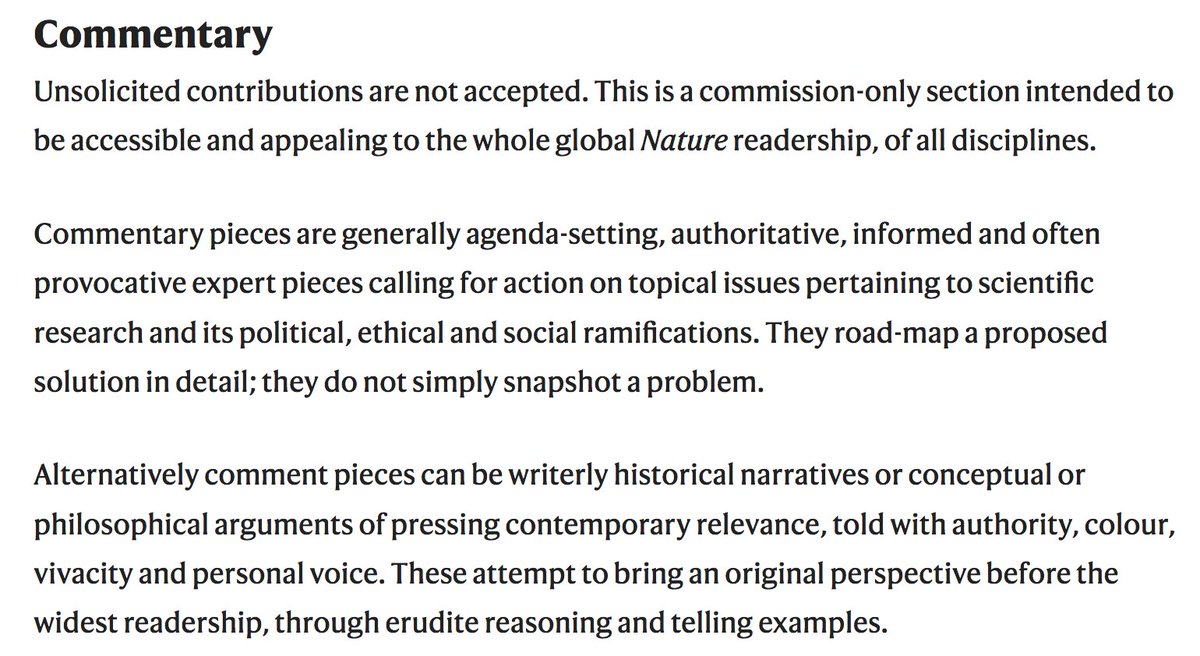Discover and read the best of Twitter Threads about #SROCC
Most recents (15)
Thank you to the @IPCC_CH's 700+ experts from 90 nations for completing #AR6. A multilateral tour de force of #ClimateScience.
Here are 5 #infographics that help explain the individual reports captured in this #IPCC cycle.
A synthesis of the synthesis 🤔 is in the works!

Here are 5 #infographics that help explain the individual reports captured in this #IPCC cycle.
A synthesis of the synthesis 🤔 is in the works!


1) Global Warming of 1.5°C (2018) #SR15
ipcc.ch/report/infogra…
Working with @SISeneviratne, @JoeriRogelj, @MelichatGo and countless others. We translated into five languages aside from English: Mandarin, Arabic, Russian, Spanish and French @BMHayward

ipcc.ch/report/infogra…
Working with @SISeneviratne, @JoeriRogelj, @MelichatGo and countless others. We translated into five languages aside from English: Mandarin, Arabic, Russian, Spanish and French @BMHayward


Jours tempétueux a venir sur🇫🇷 avec succession de coups de vent, fort cumul de 🌧️ sur certaines régions... Exact timing&force a affiner!
Quel lien avec #ChangementClimatique? Contrairement a bcp d'extrêmes, l'influence humaine sur les tempêtes n'est pas claire!
C parti pour un🧵
Quel lien avec #ChangementClimatique? Contrairement a bcp d'extrêmes, l'influence humaine sur les tempêtes n'est pas claire!
C parti pour un🧵
Les processus physiques associés aux #tempêtes/dépressions extratropicales sont multiples & complexes. Pour comprendre les effets potentiels de l'influence humaine sur leur intensité/force/trajectoires, commençons par les décrire brièvement!
2/
2/
🙏@VietNam_UN pour l'invitation à présenter les points clés du rapport du GIEC climat 2021 à la réunion Arria-formula du conseil de sécurité de l'ONU lundi.
Diapos : sharebox.lsce.ipsl.fr/index.php/s/UH…
Pour en savoir plus sur cette réunion : media.un.org/en/asset/k1i/k…
🧵 ⬇️
Diapos : sharebox.lsce.ipsl.fr/index.php/s/UH…
Pour en savoir plus sur cette réunion : media.un.org/en/asset/k1i/k…
🧵 ⬇️
La zone côtière de faible altitude abrite 680 millions de personnes et des infrastructures critiques, avec une exposition et une vulnérabilité croissantes aux aléas côtiers. 

Les augmentations régionales de l'élévation du niveau de la mer, les événements extrêmes liés au niveau de la mer, les inondations et l'érosion côtières qui en résultent affectent les risques tels que la submersion, la salinisation ou les entraves au drainage.
👏 Congratulations to the entire @IPCC_CH #WGI team!
📣The final #AR6 #WGI report📘, including the concise draft Summary for policy makers, has been completed on time⏱️.
I am very proud of the outcome!
(1/...)
📣The final #AR6 #WGI report📘, including the concise draft Summary for policy makers, has been completed on time⏱️.
I am very proud of the outcome!
(1/...)

🙏The impressive dedication of everyone was critical to complete a rigorous, exhaustive, objective & transparent assessment of the state of climate science knowledge, with many novel aspects, and with the highest quality standards, despite challenging circumstances 😷.
(2/...)
(2/...)
This was made possible by the 🔹amazing 🔹WGI Technical Support Unit!
Kudos to @anna_pirani @Clo_Pean @connorsSL @leahgoldfarb Yang Chen @georobin @MelichatGo @SoBrgr Rong Yu Baiquan Zhou @OzgeYelekci @NadaCaud @leitzell Mengtian Huang @LonnoyE @TMWaterfield
(3/...)
Kudos to @anna_pirani @Clo_Pean @connorsSL @leahgoldfarb Yang Chen @georobin @MelichatGo @SoBrgr Rong Yu Baiquan Zhou @OzgeYelekci @NadaCaud @leitzell Mengtian Huang @LonnoyE @TMWaterfield
(3/...)
Je vois un microbiologiste qui s'exprime sur le changement climatique, sans le moindre #factchecking @BFMTVNewsDesk. Ce n'est pourtant pas si difficile, prenons par exemple cet extrait (THREAD) 
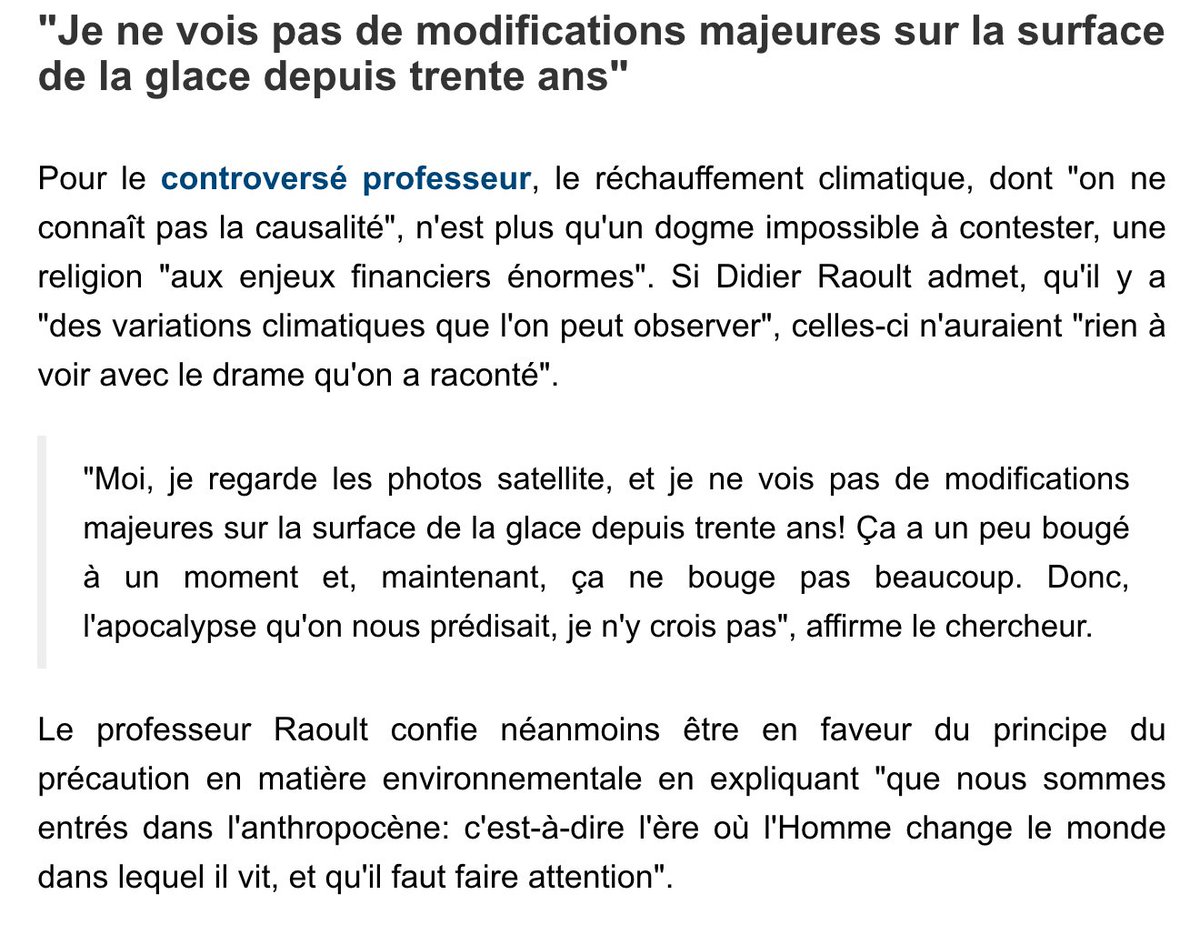
Revenons donc 30 ans en arrière, dans les années 1990.
Quels étaient les connaissances scientifiques de l'époque sur les variations de la glace de mer (banquise) en Arctique et en Antarctique et leurs évolutions possibles?
Quels étaient les connaissances scientifiques de l'époque sur les variations de la glace de mer (banquise) en Arctique et en Antarctique et leurs évolutions possibles?
Première possibilité de #factchecking, prendre les articles scientifiques (dans les journaux à comité de lecture) de l'époque, avec le mot clé "sea ice", par exemple sur scholar.google.fr (on peut filtrer par période de temps).
[THREAD,1/9] Ocean heat content (0-2000m) data from IAP and NOAA/NCEI was just released, NO surprise, 2019 was the warmest year on record for global ocean. Not only that, the past 5/10 years are the warmest 5/10 years! [link.springer.com/article/10.100…] 
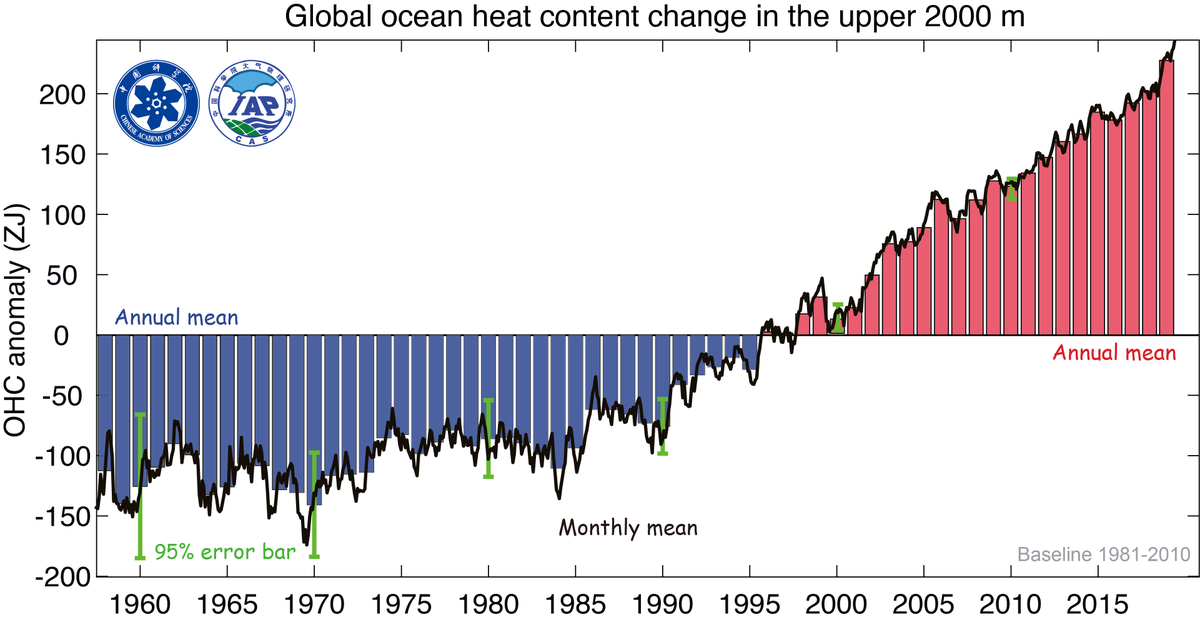
[2/9] OHC is one of the key measure of global warming. Human activities emit greenhouse gases (i.e. CO2) into the air, which taps more and more heat in the climate system. Ocean stores more than 90% of the global warming heat!
#CulturalHeritage is addressed in #SR15 with a focus on #tourism, in its chapter 3 (impacts on natural and human systems):
ipcc.ch/sr15/chapter/c…
ipcc.ch/sr15/chapter/c…
En français cette fois (après la version anglophone)
FIL - Les "points de bascule" du climat dans les rapports spéciaux du #GIEC @IPCC_CH de 2018 et 2019
FIL - Les "points de bascule" du climat dans les rapports spéciaux du #GIEC @IPCC_CH de 2018 et 2019
La question de ces points de bascule du climat a récemment suscité un très large intérêt, suite ) la couverture médiatique de ce commentaire publié par @NatureNews :
nature.com/articles/d4158…
nature.com/articles/d4158…
THREAD – CLIMATE TIPPING POINTS IN @IPCC_CH 2018 AND 2019 SPECIAL REPORTS
There has recently been a very broad interest in the issue of climate tipping points, following the media coverage of this commentary in @NatureNews : nature.com/articles/d4158…
Reading IPCC's Special Report on The Ocean and Cryosphere
in a Changing Climate (#SROCC), published last week. You can find it here: ipcc.ch/srocc/home/
in a Changing Climate (#SROCC), published last week. You can find it here: ipcc.ch/srocc/home/
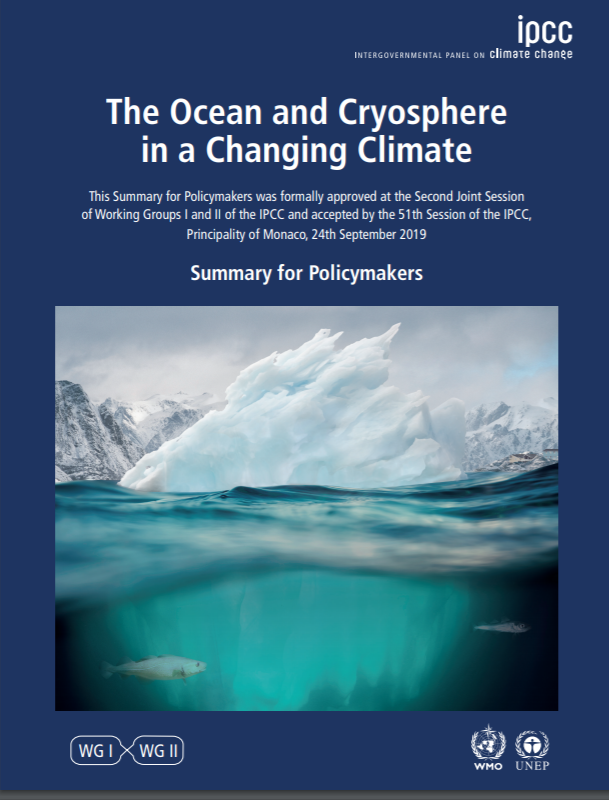
@IPCC_CH Less known than ice loss:
Snow cover is already shrinking too.
"Arctic June snow cover extent on land declined by 13.4 ± 5.4% per decade from 1967 to 2018, a total loss of approximately 2.5 million km2, predominantly due to surface air temperature increase (high confidence).
Snow cover is already shrinking too.
"Arctic June snow cover extent on land declined by 13.4 ± 5.4% per decade from 1967 to 2018, a total loss of approximately 2.5 million km2, predominantly due to surface air temperature increase (high confidence).
In nearly all high mountain areas, the depth, extent and duration of snow cover have declined over recent decades, especially at lower elevation (high confidence)."
Just finished reading the 45-page summary of the @IPCC Special Report on the Ocean and Cryosphere (#SROCC). Full report is over 1,000 pages and cites 700+ scientific papers. Here's a short(ish) summary of the summary: 
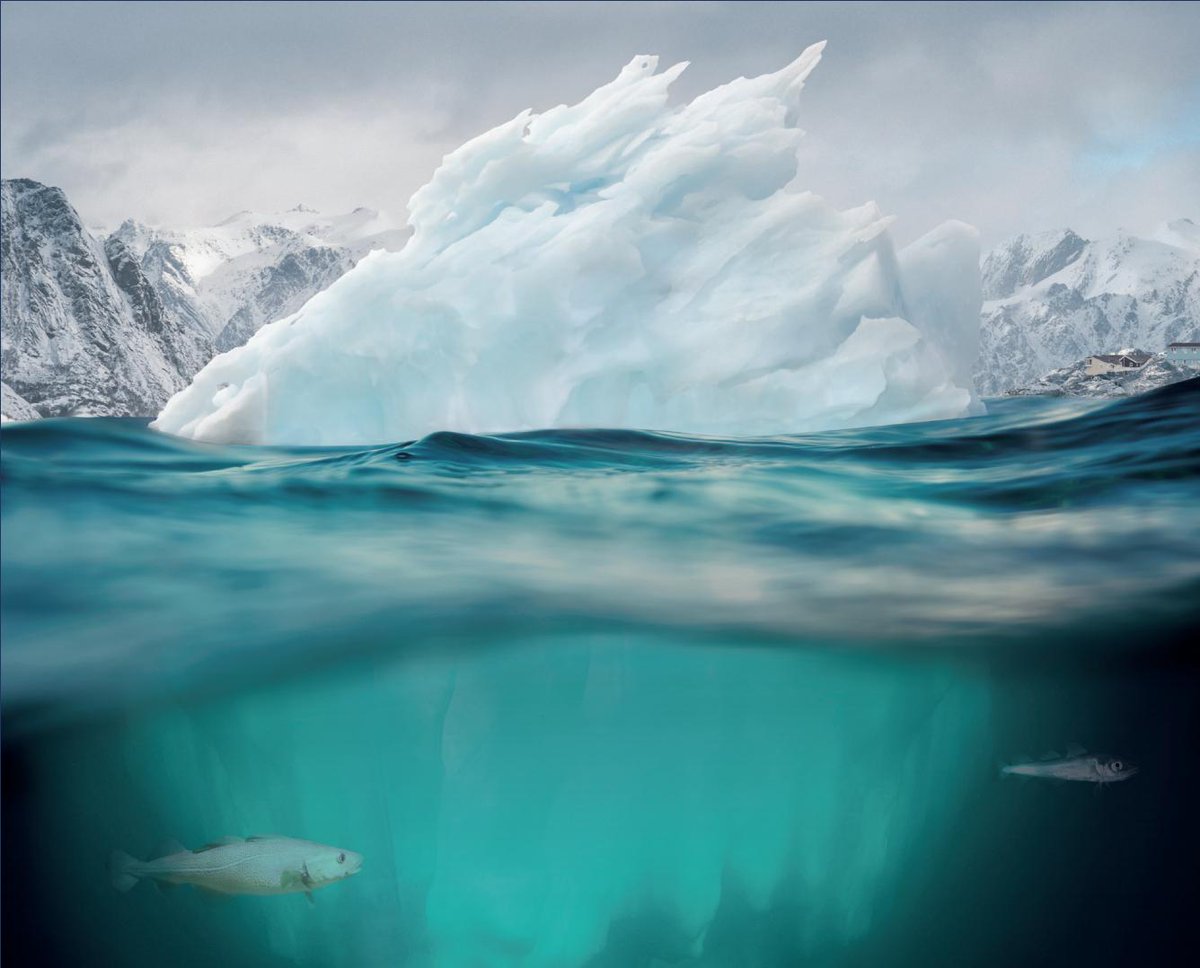
The #SROCC) follows two other recent special reports:
- The @IPCC report on Climate Change and Land
- The @IPBES Global Assessment Report on Biodiversity
report.ipcc.ch/srocc/pdf/SROC…
ipbes.net/global-assessm…
ipcc.ch/report/srccl/
- The @IPCC report on Climate Change and Land
- The @IPBES Global Assessment Report on Biodiversity
report.ipcc.ch/srocc/pdf/SROC…
ipbes.net/global-assessm…
ipcc.ch/report/srccl/
The summary covers observed changes and impacts, projected changes and risks, and responses. It uses the usual language of confidence levels, e.g. "virtually certain" (99-100%), "very likely" (90-100%), "likely" (66-100%. I'll focus on conclusions in these three categories.
1. The #IPCC has released another Special Report, this time on the Ocean & Cryosphere in a Changing Climate #SROCC.
Oceans (top) & mountain & polar regions (bottom) all have pretty severe impacts.
About the only benefit is for Arctic shipping & kelp!
ipcc.ch/srocc/home/
Oceans (top) & mountain & polar regions (bottom) all have pretty severe impacts.
About the only benefit is for Arctic shipping & kelp!
ipcc.ch/srocc/home/
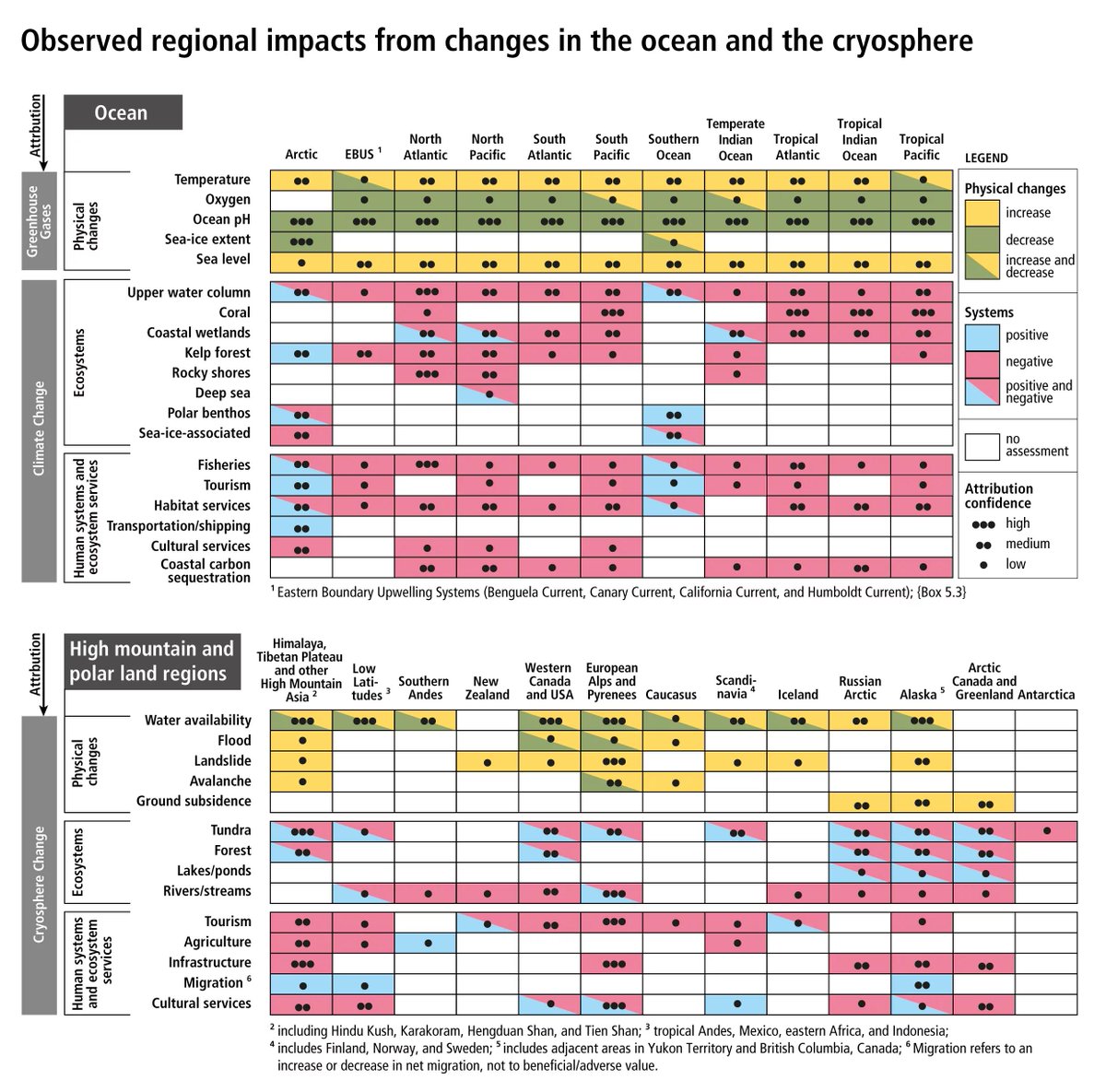
2. The report's headlines focus on RCP8.5 (red) versus RCP2.6 (blue), "reflecting the available literature".
Reality will lie somewhere in between these two extremes, but important to highlight that changes relative to the recent situation (1986-2005) are already extreme...
Reality will lie somewhere in between these two extremes, but important to highlight that changes relative to the recent situation (1986-2005) are already extreme...

3. "RCP8.5 is a high GHG emission scenario in the absence of [climate] policies... Compared to the total set of RCPs, RCP8.5 corresponds to the pathway with the highest GHG emissions."
True, but RCP8.5 is an extreme baseline & many think implausible...
carbonbrief.org/explainer-the-…
True, but RCP8.5 is an extreme baseline & many think implausible...
carbonbrief.org/explainer-the-…
Le #SROCC est unique en son genre, parce que pour la première fois, le GIEC a examiné les endroits les plus reculés de la Terre, du sommet des plus hautes montagnes et des lointaines régions polaires, jusqu'au fond de l'océan.
Nous avons constaté que le changement climatique causé par l'homme est évident même et surtout dans ces endroits.
Ce rapport met en évidence la fonte des glaciers de haute montagne et des calottes glaciaires polaires, et leurs conséquences pour le niveau des mers et l'accès à l'eau.
The difference between RCP8.5 (high CO2, “business as usual”) and RCP2.6 (aggressive decarbonization) is striking. Under 2.6, we change for 30 years, then stabilize. Under 8.5, the changes keep coming and every year gets harder and harder.
ipcc.ch/site/assets/up…
ipcc.ch/site/assets/up…
I hadn’t thought much about deoxygenation of the ocean until #NCA4. This is an area of research to watch. I suspect many observed temperature impacts on ocean life are actually related to oxygen. @OceanForecaster @JohnFBruno
Het @IPCC_CH Special Report on the Oceans and Cryosphere (#SROCC) is openbaar en een schat aan informatie over de meest recente wetenschappelijke inzichten over oceanen en de bevroren wereld: ipcc.ch/srocc/home/
Wat mij opvalt: 1/n
Wat mij opvalt: 1/n
@IPCC_CH 1) Zeespiegelschattingen tot 2100 zijn naar boven bijgesteld (+4 cm naar 39 cm bij succesvol klimaatbeleid, +11 cm naar 84 cm zonder beleid (RCP8.5)). De kans op extreme zeespiegelstijging door instorten van delen Antarctica is nog steeds niet main-stream 2/n
@IPCC_CH 2) De zeespiegel stijgt onmiskenbaar steeds sneller.
1,4 mm/yr tussen 1901 en 1990
2,1 mm/yr tussen 1970 en 2015
3,2 mm/yr tussen 1993 en 2015
3,6 mm/yr tussen 2005 en 2015
Nu dus ruim 2,5 x zo snel als vorige eeuw 3/n
1,4 mm/yr tussen 1901 en 1990
2,1 mm/yr tussen 1970 en 2015
3,2 mm/yr tussen 1993 en 2015
3,6 mm/yr tussen 2005 en 2015
Nu dus ruim 2,5 x zo snel als vorige eeuw 3/n




